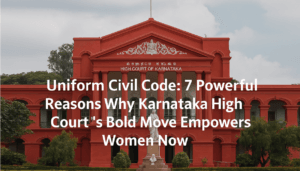Uniform Civil Code: 7 Powerful Reasons Why Karnataka High Court’s Bold Move Empowers Women Now
The Karnataka High Court has strongly advocated for the implementation of a Uniform Civil Code (UCC), stating it is crucial to uphold constitutional values like equality, justice, and secularism. Justice Hanchate Sanjeevkumar, while ruling on a family property dispute, highlighted the unfair treatment of women under various religious personal laws. He emphasized that despite women having equal status under the Constitution, many still face discrimination due to outdated personal laws.
The court pointed out that Hindu women now enjoy equal inheritance rights, unlike Muslim women who continue to be denied similar rights. Referring to Article 44, the judge asserted that a UCC would fulfill the aspirations of the Constitution’s Preamble. He also drew attention to Dr. B.R. Ambedkar’s vision, who supported a common civil code for all to promote true secularism. The remarks came during a case involving the heirs of Abdul Basheer Khan, where the court upheld a woman’s right to her share in family property.
Beyond the individual case, the court used this opportunity to call for long-overdue legal reforms that ensure equal rights for all women, regardless of religion.

Uniform Civil Code: 7 Powerful Reasons Why Karnataka High Court’s Bold Move Empowers Women Now
In a significant move, the Karnataka High Court has urged India’s Parliament and state governments to prioritize the implementation of a Uniform Civil Code (UCC), emphasizing its critical role in advancing equality, justice, and secularism as enshrined in the Constitution. The court’s remarks came during a ruling on a family property dispute, where it underscored how religion-based personal laws often perpetuate discrimination against women, despite constitutional guarantees of equal rights.
A Landmark Case Highlighting Legal Disparities
The case centered on the inheritance rights of Shahnaz Begum, the daughter of Abdul Basheer Khan, who passed away without leaving a will. Following her father’s death, Shahnaz claimed her share of the family estate. After her demise, her husband, Sirajuddin Macci, continued the legal battle. A lower court had initially recognized Shahnaz’s right to a one-fifth share in three joint family properties. However, when her siblings challenged this decision and Sirajuddin sought additional claims, the High Court upheld the original ruling, dismissing the extra demands due to insufficient evidence.
While resolving the dispute, the court seized the opportunity to address broader systemic issues. Justice Hanchate Sanjeevkumar, who delivered the verdict, highlighted how inconsistent personal laws across religions create glaring inequalities, particularly in matters like inheritance, marriage, and family rights. He stressed that a UCC—a common set of civil laws applicable to all citizens, irrespective of faith—would help bridge these gaps and align India’s legal framework with constitutional ideals.
Personal Laws vs. Constitutional Equality
Justice Sanjeevkumar pointed to stark contrasts between Hindu and Muslim personal laws. For instance, Hindu women now enjoy equal inheritance rights as men under amended laws, whereas Muslim women often face limitations in claiming parental property. Such disparities, the judge argued, contradict Article 14 of the Constitution, which guarantees equality before the law. He emphasized that while religious freedoms are protected, they cannot override fundamental rights, especially when they disadvantage women.
Quoting Article 44 of the Constitution, which envisions a UCC as a directive principle for governance, the judge noted that this reform is long overdue. He referenced Dr. B.R. Ambedkar’s advocacy during the Constitution’s drafting, where the architect of India’s legal framework championed the UCC as vital for fostering national unity and secularism. The court observed that fragmented personal laws not only undermine gender justice but also hinder the nation’s progress toward becoming a truly egalitarian society.
Why a Uniform Civil Code Matters
The court’s push for a UCC stems from its potential to standardize rights and obligations for all citizens, eliminating biases rooted in religious traditions. For example, under existing laws, a Hindu daughter can inherit ancestral property equally with her brothers, while a Muslim daughter’s share may be limited. Similarly, issues like divorce, maintenance, and adoption are governed by differing religious codes, often leaving women vulnerable. A UCC would replace these fragmented laws with a unified system, ensuring that justice is not determined by one’s faith.
Justice Sanjeevkumar also highlighted the Preamble’s vision of justice, liberty, and equality, asserting that a UCC would reinforce these principles. He argued that true secularism cannot coexist with laws that prioritize religious customs over constitutional morality. By addressing inequalities in personal laws, a UCC would empower women across communities and strengthen India’s democratic fabric.
Challenges and the Path Ahead
Implementing a UCC, however, remains a complex and sensitive task. Critics argue that it risks infringing on cultural and religious freedoms, while supporters view it as essential for gender justice. The court acknowledged these concerns but maintained that constitutional values must prevail. It called for collaborative efforts between lawmakers, legal experts, and civil society to draft a code that respects diversity while upholding equality.
The Karnataka High Court’s stance has reignited a decades-old debate, bringing the UCC back into the national spotlight. As the government considers this recommendation, the focus will be on balancing tradition with modernity and ensuring that reforms are inclusive and equitable.
Conclusion
The court’s verdict transcends the specifics of a property dispute, shedding light on systemic inequalities embedded in India’s legal system. By advocating for a Uniform Civil Code, the judiciary has underscored the urgency of aligning personal laws with the Constitution’s promise of equality. While challenges lie ahead, this ruling marks a pivotal step toward reimagining a society where justice is not conditional on gender or religion—a vision that lies at the heart of India’s democratic ethos.
You must be logged in to post a comment.